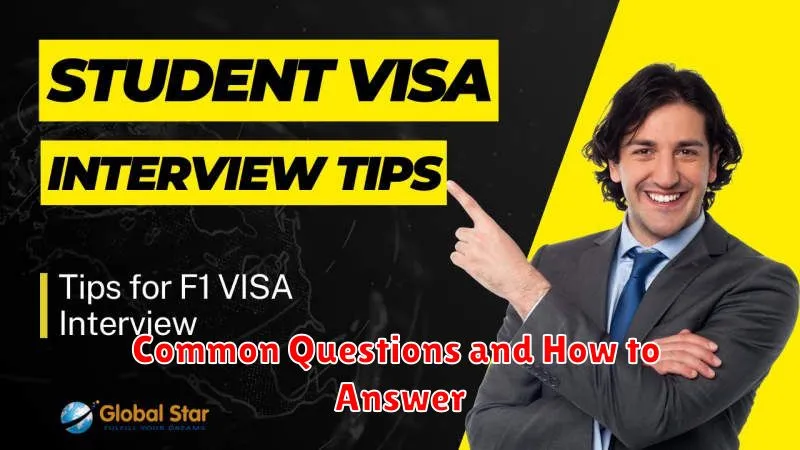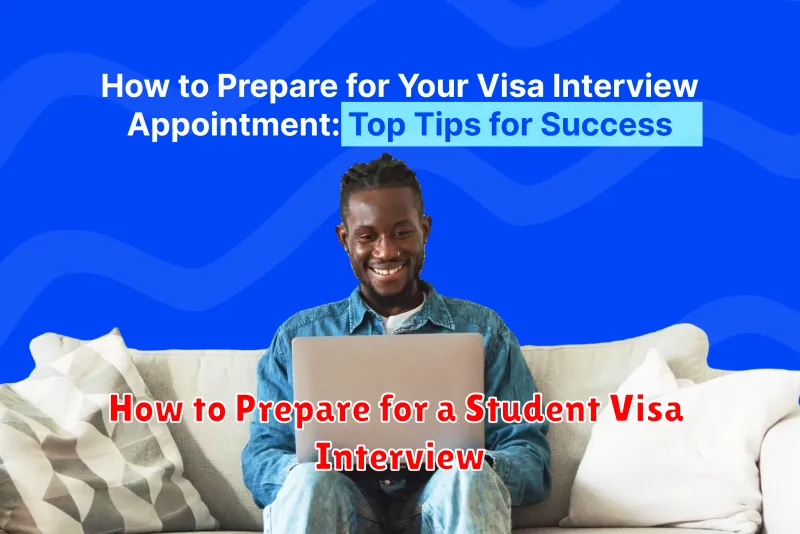Preparing for a student visa interview can be a daunting task. A successful interview is crucial for obtaining your student visa and beginning your academic journey abroad. This article will provide you with essential guidance on how to effectively prepare for your student visa interview, covering key aspects such as required documentation, common interview questions, and tips for presenting yourself confidently. Understanding the nuances of the visa interview process and demonstrating your preparedness can significantly increase your chances of a positive outcome. Whether you’re applying for an F1 visa, J1 visa, or another type of student visa, the information presented here will be invaluable in navigating this critical step.
Securing a student visa is a significant milestone in pursuing international education. This article will equip you with the knowledge and strategies needed to confidently approach your visa interview. We’ll delve into the specifics of what consular officers look for, how to articulate your academic plans clearly, and how to address any potential concerns they may have. By following the advice and insights provided, you can optimize your chances of successfully obtaining your student visa and embarking on your educational pursuits.
What to Expect in the Interview
The visa interview is a critical step in the student visa application process. It allows the consular officer to assess your qualifications, intentions, and overall eligibility for a visa. Be prepared to answer questions about your academic background, chosen program of study, financial resources, and ties to your home country.
The interview is typically short, often lasting just a few minutes. The officer will ask you specific questions related to the information you provided in your application. It is essential to answer truthfully and concisely. Bring all required documentation to the interview in an organized manner.
Common questions include:
- Why did you choose this specific university and program?
- How will you finance your studies and living expenses?
- What are your plans after completing your studies?
- What ties do you have to your home country that will ensure your return after graduation?
Be prepared to explain any gaps in your educational history or any previous visa refusals. Maintain a positive and confident demeanor throughout the interview. Dress professionally as this demonstrates respect for the process.
Common Questions and How to Answer

Visa interviews can be nerve-wracking. Preparation is key to a successful outcome. Understanding the common questions and how to answer them honestly and confidently can greatly increase your chances of visa approval.
Study Plans
Be prepared to discuss your study plans in detail. Why did you choose this particular program and university? What are your academic goals? How will this program benefit your future career? Have clear and concise answers ready.
Financial Stability
Demonstrate your ability to finance your education and living expenses. Provide clear documentation of your funding sources, whether it’s personal savings, family support, or scholarships. Be prepared to explain any financial documents you present.
Ties to Home Country
The visa officer needs to be assured that you will return to your home country after completing your studies. Explain your ties to your home country, such as family obligations, property ownership, or future career prospects.
Required Documents Checklist
Having all necessary documents meticulously prepared is crucial for a successful student visa interview. This checklist will help ensure you have everything in order.
Essential Documents
- Valid Passport: Ensure your passport is valid for at least six months beyond your intended period of stay.
- Visa Application Form: The completed and signed application form specific to your country.
- Acceptance Letter: The official acceptance letter from your educational institution.
- Financial Documentation: Proof of sufficient funds to cover tuition, living expenses, and return travel.
- Academic Transcripts and Certificates: Original or certified copies of your academic records.
Supplemental Documents (May be required)
- Standardized Test Scores: TOEFL, IELTS, GRE, GMAT, etc. as required by your program.
- Statement of Purpose: Clearly outlining your academic goals and reasons for choosing the specific program and institution.
- Letters of Recommendation: Strong recommendations from teachers or professors.
- Medical Examination Records: Certain countries may require specific medical examinations.
Note: Specific document requirements vary by country and institution. Always confirm the complete list with the relevant embassy or consulate and your chosen educational institution.
Practicing Your Responses
Practicing your responses is crucial for a successful visa interview. It builds confidence and allows you to articulate your intentions clearly.
Start by reviewing common visa interview questions. Consider questions related to your study plans, financial stability, and ties to your home country. Prepare concise and honest answers. Avoid memorizing responses verbatim, as this can sound unnatural. Instead, focus on understanding the key points you want to convey.
Practice answering these questions aloud, either by yourself or with a friend. This helps you refine your responses and identify any areas where you need more clarity. Consider recording yourself to evaluate your body language and speaking pace.
Mock interviews are highly beneficial. Ask a friend, family member, or mentor to conduct a mock interview with you, simulating the actual interview environment. This will help you manage nerves and become more comfortable answering questions under pressure.
Dress Code and Body Language
Your appearance and demeanor play a significant role in the visa interview. Dress professionally, as you would for a job interview. This demonstrates respect for the process and the visa officer.
Appropriate attire could include business casual or formal wear. Avoid overly casual clothing like jeans, t-shirts, and sneakers. Ensure your clothes are clean, neat, and presentable.
Maintain confident body language. Make eye contact with the visa officer when speaking and answering questions. Sit upright and avoid fidgeting. A calm and composed demeanor projects confidence and honesty.
Be polite and respectful throughout the interview. Answer questions clearly and concisely. Avoid interrupting the visa officer and offer complete, truthful responses.
Explaining Study Intentions Clearly
A visa officer needs to understand why you chose this particular course of study. Be prepared to articulate your academic goals and how they align with your chosen program. Clearly explain what attracted you to this specific field and institution. Be specific. Mentioning specific professors, research opportunities, or curriculum aspects that appeal to you can demonstrate genuine interest.
Connect your study plans to your long-term career aspirations. How will this degree help you achieve your professional goals? A clear connection between your studies and your future plans strengthens your case. Explain how the skills and knowledge gained from this program will be valuable in your chosen career path back in your home country. This demonstrates your intention to return home after completing your studies.
Be ready to discuss alternative programs you considered. Briefly mentioning other universities or programs you researched and explaining why you ultimately chose this particular one shows that you’ve carefully considered your options.
Following Up After the Interview
After your visa interview, it’s important to handle the waiting period professionally and efficiently. While you might be anxious to hear the results, avoid contacting the embassy or consulate excessively. Inquiries immediately following your interview are generally discouraged as the visa officer needs time to process your application.
If you haven’t received a decision within the timeframe provided by the embassy or consulate, you may then send a polite and concise email inquiry. Clearly state your name, interview date, and application number. Avoid demanding a response; simply request an update on the status of your application.
Keep all your documentation organized and readily accessible in case you need to provide additional information. Patience is key during this period. The visa processing time can vary, and contacting the embassy or consulate repeatedly will not expedite the process.

